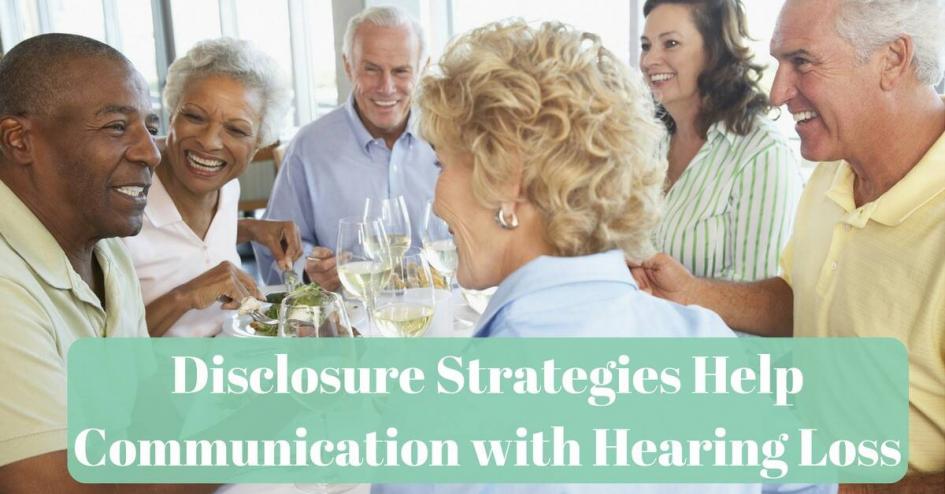
Disclosure Strategies Help Communication with Hearing Loss
Disclosure Strategies Help Communication with Hearing Loss
Communication is a vital element of people’s daily lives, allowing us to interact and form relationships with those around us. Communication helps to not only maintain friendships and form bonds with families, but it is also often essential to progressing in the workplace.
A recent study, conducted by US-based Massachusetts Eye and Ear, found that using specific strategies to disclose the effects of hearing loss to new acquaintances actually has an impact on how people respond to hearing loss.
The way hearing loss is disclosed can improve communication
The study, which surveyed 337 participants with hearing loss, asked a series of questions about how individuals disclose their hearing loss and collected samples of various phrases that people use in that disclosure.
The findings of the study caused researchers to place the participants in one of three groups: non-disclosers, basic disclosers, and multi-purpose disclosers. The level of success participants had in communicating with others largely correlated with their discloser group.
Non-disclosure can have a negative impact upon communication with others
The non-discloser group includes people who, essentially, hide their hearing loss, rather than being forthcoming with others. One of the common phrases of a person in this category would be, “I’m sorry, can you speak up? I can’t hear you.”
Such a phrase does not give the other person any context to the reason as to why someone cannot hear them. It could be that they are speaking too quietly or the surroundings are too loud or, as in this case, the person experiences hearing loss. If a person is unaware that someone experiences hearing loss, there is nothing that they can actively do to accommodate that impairment.
Basic disclosers: Disclosing hearing loss, but nothing more
People in the basic discloser category do, in fact, disclose their hearing loss. This is clearly a good step in the right direction, but does it go far enough?
Saying something akin to, “I’m hard of hearing due to an injury that happened when I was a child” does let the other person know about hearing loss, but it again does not give adequate detail about hearing loss. Multi-purpose disclosers, on the other hand, go that little bit further, and it is this extra step that improves communication with others.
How using a multi-purpose disclosure strategy can improve communication with others
The key to successfully using a multi-purpose disclosure strategy is to not only inform someone that you experience hearing loss, but also to provide them with a suggestion to accommodate that hearing loss.
For example, you might say, “I’m sorry, but I have trouble hearing out of my right ear. Could you please speak to me from my left-hand side instead?”
This very simple phrasing can, according to the study, make a significant difference in levels of support and accommodation obtained from others. Those people surveyed who fit into the multi-purpose discloser category reported positive reactions overall, and it is evident that adopting such a strategy could help to alleviate tension and anxiety around disclosure.
Konstantina M. Stankovic, M.D., Ph.D., FACS, a senior author of the study, emphasised that using a multipurpose disclosure strategy could help build confidence and improve communication with others (medicalxpress.com). The focus is on empowerment and taking control of your hearing loss; by disclosing your hearing loss upfront with some helpful guidance on how to accommodate it, it may make communicating with others easier.
The full findings of the study can be found in the Ear and Hearing Journal, £££.The importance of communication and its links with hearing loss
The facilitation and improvement of communication is often a reason cited for why people choose to treat their hearing loss through the use of hearing aids. The motivation for improving hearing loss may be due to the way hearing loss can affect communication in a number of ways, as it can impact on a person’s life in ways that are not as obvious as one may think.
Research has shown that issues with communicating effectively, which are caused by hearing loss, are directly linked with higher rates of dependence, frustration, loneliness and isolation. In addition, the likelihood of an older person developing depression rises 2.5 times if that person experiences hearing loss (actionhearingloss.org.uk).
It is likely that some of the reasons for links between hearing loss and feelings such as isolation and loneliness has something to do with the way untreated hearing loss can negatively impact upon a person’s ability to communicate. This is why it is so important to consider how people experiencing hearing loss communicate with others and, in particular, the way that hearing loss is disclosed.
House of Hearing UK may be able to help
If you are concerned about your hearing, contact our team of hearing professionals to book an appointment today. Treating your hearing loss through the use of hearing devices may assist you in communicating with your loved ones, in the workplace and in your day-to-day life.
You may also find it useful to take the Action on Hearing Loss free online hearing test, available here. Please note that this is for guidance only and is not an alternative to a professional examination. If you have any questions, do not hesitate to contact our team.
House of Hearing
Edinburgh | Galashiels | Perth | St Andrews
0131 220 1220
Our Clinics
All House of Hearing clinics are in town centre locations and accessible to public transport and parking. Home visits also available if mobility is an issue.


.png)
.png)
.png)

.png)
